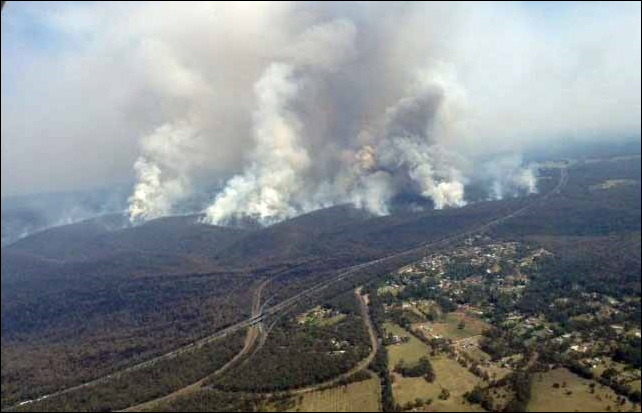Massive bushfires in Australia blamed on climate change – ‘Carbon pollution is a heat-trapping greenhouse gas that is like putting the weather on steroids’
By Jean Williams
25 October 2013 (examiner.com) – Three major bushfires and more than 60 smaller ones have been burning across parts of Southern Australia for seven days without an end in sight, NBC News is reporting. In a risky move, the Blue Mountain region firefighters deliberately joined the State Mine fire with the Mount Victoria fire, but officials fear they could quickly merge with the Linksview Road blaze in the “worst possible scenario” to form a mega-bushfire, which would greatly reduce the ability to contain it as the fires approach Sydney. CNN reports that more than 200 homes have been destroyed and 300,000 acres burned. There were 1500 firefighters brought in to join the current 1000 exhausted firefighters in battling the apocalyptic blazes Tuesday. The heat, dry conditions and wind could cause the monster fires to literally create their own weather phenomenon. […] Australian climate scientists are not shy about blaming the increased heat, droughts and extreme weather conditions on climate change. The same was indicated by the unusual and historic rainfall that briefly hit the country in 2010. “Carbon pollution is a heat-trapping greenhouse gas that is like putting the weather on steroids. It drives the greater extremes. It’s not just warmer weather it’s wilder weather,” said John Connor, the CEO of the Climate Institute. In addition, massive wildfires spew tons of pollutants and emissions into the atmosphere, which contributes to global warming. Furthermore, Adam Bandt, Greens Deputy Leader, who recently wrote an article for The Guardian, complained about the newly elected climate denier as prime minister. “It’s October and we’re having tragic bushfires, and meanwhile, Tony Abbott and his ministers have been out every day this week saying that they’re going to take Australia backwards when it comes to combating global warming.” Abbott, who once called climate change “absolute crap,” ran on the promise to drop the carbon tax that was credited for the recent drop in carbon dioxide emissions, but the tax was reviled by resource-sucking corporations. [more]
Massive bushfires in Australia blamed on climate change 
By Simon Lauder and staff
25 October 2013 (ABC) – As the Federal Government continues to reject claims that recent bushfires are linked with climate change, a report by scientists has stirred the debate further by saying the two are indeed linked. The Climate Council, which was called the Climate Commission before it was recently de-funded by the Coalition Government, says climate change is increasing the probability of extreme fire weather days and is lengthening the fire season. When questioned about it this morning, Federal Environment Minister Greg Hunt said there was “no debate” about the science and he said it was unfortunate that some people have used the New South Wales bushfire situation to make a political point. The political debate began last week when Greens MP Adam Bandt wrote an article about it, and tweeted that there would be more bushfires as a result of the Coalition’s climate policy. “The debate this week has been an attempt by some to misuse tragedy and suffering and hardship and nobody should do that,” Mr Hunt said. The group of climate scientists, including Professor Will Steffen from the Australian National University, says with a lot of misinformation about, the facts need to be put on the table. Professor Steffen was part of the Climate Commission, which was set up by the former Labor government to provide scientific information about climate change. It was dismantled by the Coalition, but its members sought public donations to continue their work and now call themselves the Climate Council. Today, the council is bringing forward some of the interim findings from a new bushfires and climate change report. Professor Steffen says to deny the influence of climate change in areas of Australia with extreme bushfires places people and property at risk. “To deny and say that nothing is happening and we don’t need to change anything actually would increase risk for people and property,” he said. “Fortunately fire authorities do understand the science and are taking, I think, appropriate action to deal with these increased risks.” He says the link between bushfires and climate change is straightforward. “Hotter, drier weather increases the risk of fires. It is pretty obvious we don’t have many fires during the winter time; we have a lot more fires during the summertime when the climate is hotter,” he said. “Of course, the link then to climate change is we now have a hotter climate in general than we had 50 years ago. “There is more heat in the atmosphere because of the additional greenhouse gases that humans have put into the atmosphere. So that sort of link is really straightforward to make.” [more]
Climate Council on the link between bushfires and climate change
